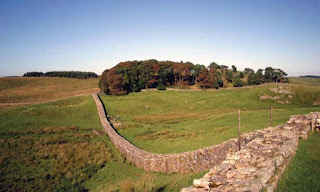Hope

In times of nationalism and talk about borders and fences, it's important to see the bigger picture. From the time that humans spread from Africa, our world have become bigger and bigger. And the interaction between different parts of the world have increased. As Yuval Harari has stressed, is this trend supported by dark events like wars, colonization and in these days the climate effect. In the long run this trend seem unstoppable. Once the Romans built a wall in England to secure the empire, Hadrian's wall. It's still there. Very long, from shore to shore. Hadrian was an emperor from 117 to 138 AD. The western part of the empire was soon going to undermine itself. But now, in a much more peaceful time, the borders in Europe is secured on other ways and its still possible for the most of us to travel in Europe. We live in quite peaceful time, compared to the last centuries. Media reports of every incident, so it seems not to be so, but it is. And